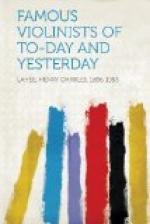Giovanni Baptiste Viotti has been called the last great representative of the classical Italian school, and it is also stated that with Viotti began the modern school of the violin. In whatever light he may be regarded, he was undoubtedly one of the greatest violinists of all. He retained in his style of playing and composing the dignified simplicity and noble pathos of the great masters of the Italian school, treating his instrument above all as a singing voice, and keeping strictly within its natural resources. According to Baillot, one of his most distinguished pupils, his style was “perfection,” a word which covers a host of virtues.
Viotti was born in 1753 at Fontanetto, a village in Piedmont. His first musical instruction was received from his father, who is severally mentioned as a blacksmith and as a horn player. His musical talent being early noticeable, he was sent to Turin and placed by Prince Pozzo de la Cisterna under the tutelage of Pugnani, and was soon received into the royal band. In 1780 he travelled extensively, visiting Germany, Poland, and Russia, and meeting with great success. The Empress Catharine endeavoured to induce him to remain at St. Petersburg, but without success, and he proceeded to London, where he soon eclipsed all other violinists. In 1782 he went to Paris and made his debut at the celebrated Concert Spirituels. He was at once acknowledged as the greatest living violinist, but soon after this he ceased altogether to play in public. This decision seems to have been caused by the fact that an inferior player once achieved a greater success than he. He was evidently of a sensitive nature, and there is an anecdote told of him which is amusing even if its authenticity is open to question. Viotti was commanded to play a concerto at the Court of Louis XVI., at Versailles, and had proceeded through about half of his performance, when the attention of the audience was diverted by the arrival of a distinguished guest. Noise and confusion reigned where silence should have been observed, and Viotti, in a fit of indignation, removed the music from the desk and left the platform.
In 1783 Viotti returned to Italy for a short time, but the following year he was back in Paris teaching, composing, and benefiting the art of music in every way except by public performance. He became the artistic manager of the Italian Opera, and brought together a brilliant number of singers. In this business he came in contact with Cherubini, the composer, with whom he was on great terms of friendship. This enterprise was suddenly stopped by the revolution, and Viotti was obliged to leave France, having lost almost everything that he possessed.
He went to London and renewed his former successes, playing again in public at Salomon’s concerts, and in the drawing-rooms of the aristocracy. But here his ill-luck followed him, for London being full of French refugees, and the officials being suspicious of them all, he was warned to leave England, as it was feared that he was connected with some political conspiracy.




